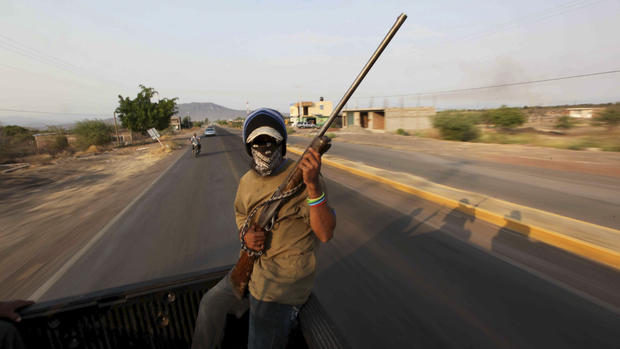Mexico's thousands of unsolved disappearances a "national scandal and a human rights crisis," Amnesty says
MEXICO CITY The number of unsolved disappearances in Mexico constitutes a national scandal and a human rights crisis, Amnesty International said Tuesday, citing what it called a systematic failure by police and prosecutors to investigate thousands of cases that have piled up since 2006.
Rupert Knox, Amnesty's Mexico investigator, said relatives are often forced to search for missing loved ones themselves, sometimes at considerable risk.
Adding insult to injury, Knox said police and prosecutors often don't even bother to use the information that relatives dig up. Instead, police routinely assume that the missing are caught up in Mexico's drug cartel conflicts.
"They are stigmatized, they are treated with disdain, and the typical thing is to say the victims were members of criminal gangs," Knox said. "That is a demonstration of the negligence that has allowed this problem to grow into a national scandal and a human rights crisis."
- U.S. Marine missing, feared kidnapped in Mexico
- Drug war's staggering toll on young Mexicans
- Mexico drug war has led to 26,121 disappearances
The federal government says some 26,000 people have been reported missing since the government launched an offensive against drug cartels in late 2006, though officials have said the true number is probably lower, because some people reported missing have since been found or accounted for but never taken off the list.
Brenda Rangel is the sister of Hector Rangel, who disappeared along with two friends in 2009 after being stopped by police for a traffic violation and was never seen again. She is sure her brother wasn't involved in criminal activity. A young businessman, he had gone to the northern state of Coahuila, which is a hotbed of the Zetas drug gang, to collect a payment from a client.
Rangel says her brother last called to say he was in police custody, and she said the family has given authorities the number of the squad car, and even the names of the policemen involved in the detention. But she said prosecutors told her the officers were fired from the local police force in Monclova, Coahuila, and couldn't be located. In Mexico, it is not uncommon for local policemen to work for drug gangs.
Nearing the fourth year in her brother's disappearance, that kind of shrugging response is driving Rangel and her family to desperation, and into danger, since they can't let it rest.
"We have received death threats," she said, adding: "I have run risks, I have gone into safe houses, I have had to disguise myself in different ways to look for my brother."
One by one, other parents and siblings of missing Mexicans stood up and recounted their horror stories: cases in which authorities themselves, police or the military, appear to have been involved in the disappearances.
Mexico's government announced last week that it is creating a special unit to search for missing people. But the unit has only 12 federal investigators and a group of federal police agents to cover all the cases.
Knox said such agencies have been tried before in Mexico but have accomplished little, in part because they have lacked the resources, manpower and authority to really perform their task.
"The authorities have always seen them (the special units) as a way to reduce public pressure and blow off steam," Knox said.
While Rangel and the other victims' families maintain faith that their loved ones are still alive, perhaps subjected to forced labor by the drug cartels, Mexico's National Human Rights Commission has received information on 15,921 unidentified bodies that have passed through morgues in Mexico, some of which could belong to the missing.
A recent case in Mexico City has highlighted the difficulties surrounding cases of suspected disappearances.
On May 26, a group of young people disappeared from a Mexico City after-hours bar just off the city's main Reforma boulevard, a block and a half from the U.S. Embassy. Relatives had initially indicated 11 people were missing, but authorities raised the number of 12 Tuesday night.
The young people were from the rough-and-tumble Tepito neighborhood and their disappearance only came to light after their parents and other Tepito residents held a protest that blocked a major road. Media reports later said that the fathers of two of the missing young men were suspected former Tepito crime bosses currently doing time in prison.
A witness who said he escaped from the abduction said the young people were taken away by gunmen in masks after partying through the night at the bar. Prosecutors said Tuesday night that surveillance video was found showing the young people entering the bar, but wouldn't say if there was footage showing them leaving or being abducted.
The witness who reported the kidnapping can no longer be found. The bar's owner also is missing, but prosecutors said Tuesday night that two waiters and a woman had been detained in the case.
The families have put up missing-person posters with photos of their loved ones throughout the area, and say that almost 10 days later they still have not come home.
